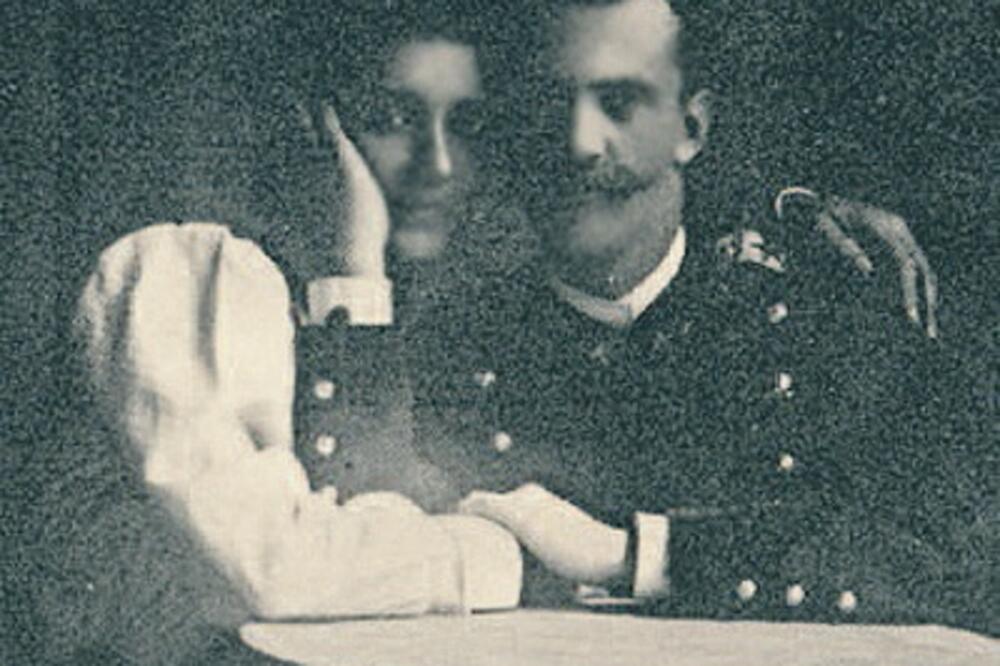The news that quickly traveled around Italy on December 16, 2017, and then around the world, read as follows:
Her Royal Highness Jelena of Savoy, Queen of Italy, (Queen of Ethiopia 1936-1943, Queen of Albania 1939-1943), born Montenegrin Princess Petrović-Njegoš, was buried in the Marian shrine of Vikaforte, in the area of the city of Cuneo, in the Piedmont region. Two days later, King Victor Emmanuel III of Italy (Ethiopia and Albania) was buried in the same place.
The royal couple is now, after 70 years, together again. Together in Piedmont, the land of the Savoys, one of the oldest ruling dynasties in Europe. This large family, which has French roots, was for centuries at the head of the autonomous Duchy of Savoy, the Alpine region of Italian and French territory, and later Piedmont with Turin as its capital. Victor Emmanuel II of Savoy, grandfather of Victor Emmanuel III, is the first king of the unification of Italy.
Although everything took place in a state organization, the recent funerals of Queen Jelena and King Victor Emmanuel III took place without fanfare. The strangeness of many details, the almost mysterious silence, spoke volumes, unfolding a great historical and life story. Because the life of the Queen of Italy and the Montenegrin princess in terms of plots, dramatic contexts, places of history where she was the protagonist, in terms of the faces of history she met - all of that, it seems, surpasses the great characters from the classic novels of the world.
We are talking, therefore, about an extremely rich biography that began with his birth in Montenegro and ended in Montpellier (Montpellier), two places that, probably coincidentally, have the word mont in their name, so - hill, mountain.
In between is a huge life baggage. There is "honey and gall" in it, as Jelena's ancestor, ruler, poet, bishop, hermit from Cetinje would say. Of course, there are undoubted successes in it, primarily family, but also public ones, on the big stage. In that luggage are also the shadows that the queen had to share undeservedly with the role of the dynasty in the historical upheavals.
Jelena of Savoy chose moderation, discretion, a precise and thoughtful word, primarily attached to her family. In fact, she was the pillar of the family. The narrowest ones certainly, but also as wide as possible. During the October Revolution of 1917, Grand Duchess Milica Romanov fled Russia, going straight to Rome to her sister Jelena. In a play of history, Milica was buried in Rome, at the famous Testac, the cemetery of elite non-Catholics, poets and artists. During the exile in Alexandria with Queen Jelena in 1946, family members arrived from various directions, the first being her daughter Đovana, Queen of Bulgaria, also fleeing the country with her child.
Brother Danilo, who was otherwise permanently in charge, had to be taken care of, if only because of debts.
Selfless help to others, help to the vulnerable were the great qualities of Queen Jelena, qualities that she practically manifested many times through her work and public example. These qualities of the Italian queen are the most profound and remain in the collective memory of the Italian people.
Let's look, necessarily fragmentarily in a newspaper article, at some moments from the life of the Montenegrin princess and the Italian queen.
Cetinje, Petrograd, Venice, (Cetinje), Rome
Jelena Petrović, daughter of the prince and lord of Montenegro, grew up in Cetinje, where she was born in 1871. In addition to being brought up in a Montenegrin family, Jelena was able to acquire a higher education and culture of behavior in the aristocratic Smoljna Girls' Institute in Petrograd. Similar to her ancestors, Jelena writes poetry. A pseudonym that has been around for a long time is - Leptir, in the Italian phase "farfarla".
This inspired the great Italian musician Giacomo Puccini to dedicate his famous opera "Madam Butterfly" to Queen Jelena.
Jelena and her mother Milena were in Venice on April 29, 1895, where they were attending the International Art Biennale. Then Princess Jelena met the Italian Prince Emmanuel for the first time. He will next be seen in Petrograd during the coronation of Nicholas II as Tsar of Russia.
After the meeting in Petrograd - according to Italian historians - Victor Emmanuel confided these words to his mother Margarita. "O Elena o nessuna" ("Either Elena or none").
An engagement in Montenegro followed. On August 1896, XNUMX, the Italian prince arrived in Bar by yacht, on his way to Cetinje, where the engagement ceremony took place.
The scenes, almost cinematic, continue in Italy - already in Bari in the church of San Nicola, where the ritual of Jelena's conversion to the Catholic faith was performed, so that in Rome on November 11, 1986, with great publicity, a civil marriage was first concluded in the Quirinal, and then and a church wedding in the church of Santa Maria degli Angeli.
Although the initial meetings of the Italian prince and the Montenegrin princess had "state influences", it is quite certain that their relationship turned into a successful marriage of love and harmony. Their five children (Jolanda, Mafalda, Umberto, Giovana and Maria) were part of their happy union, heirs who confirmed the plans for the physical and aesthetic improvement of the old Savoy dynasty.
Messina, World War I, "Queen Nurse"
The one-month cruise in Greek waters on the yacht "Jela" of the heir to the throne Viktor Emanuel and his wife Jelena of Savoy in August 1900 was interrupted by the news that King Umberto I, Victor's father, was assassinated in Brescia.
According to the "the king is dead, long live the king", already on the yacht, leaving the Greek islands and approaching the Italian waters, Victor and Jelena became the king and queen of Italy. And it will last almost half a century.
Among the many confirmations of Jelena as a calm, modest, self-sacrificing, solidary, in short people's queen, there is also a great disaster in Sicily - the devastating earthquake in Messina in 1908. The Italian queen quickly found herself in ruined Messina. For days she was a nurse among the injured, taking care of the evacuation of the more seriously injured. Many dramatic scenes are recorded in history books and textbooks. One in which Queen Jelena played an important role was specially treated.
Namely, in the Mediterranean waters not far from Messina in those days there were Russian military ships. When asked to help evacuate the unfortunate people, the admiral said that they have a precise route that they cannot change without the approval of the Russian Ministry. Historians wrote that at that time the sailors also saw Queen Jelena boarding the ship "Slavija", addressing Admiral Livtinov in Russian with these words:
"Admiral, neither the Queen of Italy nor the Princess of Montenegro is talking to you now. You are being addressed by a woman who, in the name of humanity, swears you to immediately transport these unfortunate, seriously injured persons to Naples". When Petrograd found out about this scene, and especially about the spoken words, it was quickly decided that the cruiser "Slavija" and another nearby warship would immediately set sail with the injured towards Naples.
Today, the largest hospital in Naples is named "Regina Elena". A large monument to Queen Jelena was erected in Messina in 1960, i.e. during the time of the Italian Republic.
During the First World War, King Victor and Queen Jelena decide to leave the prestigious residence of the Quirinal and move to the Savoy Villa, where they stayed for the rest of their lives in Rome. The Quirinale was turned into a hospital, again with Queen Jelena playing a significant role. After Italy's entry into the war, on May 27, 1915, King Victor Emmanuel left Rome's Termini station for the front, where he would remain until the end of the war. His role in the First World War was great, it was not by chance that he was called the "soldier king".
Fascism, the role of the king, Queen Jelena's letter from 1939.
Benito Mussolini's Italian populist movement eventually turned into a fascist dictatorship, which in wartime alliance with Hitler will lead Italy to a great tragedy, bringing it a great historical mortgage.
Member of parliament B. Mussolini, with the populist pressure of the "March on Rome", in the context of a deep and chaotic crisis in the country, became the prime minister in October 1922. The king signed the mandate, and at the first session the parliamentary majority voted to support his program. Although Victor Emanuel III is blamed, not without reason, for not standing up to Mussolini, the real powers that the king himself had in the system of constitutional monarchy should also be taken into account.
In 1939, two months after the attack of Hitler's Germany on Poland and the declaration of war on England and France, Queen Jelena launched a European initiative to prevent the coming war with her letter.
Encouraged by the letters of two princesses from the XNUMXth century, which stopped the war at that time, Queen Jelena wrote a letter to European queens in the form of "La paix des Dames". Mussolini stopped such an initiative by addressing a letter to Queen Jelena and emphasizing that "current circumstances do not recommend holding an international peace congress."
Arrest of Mussolini in 1943 in the House of Savoy
What is certain is that the arrest and overthrow of Mussolini on July 26, 1943 was organized by King Victor Emmanuel III, after a vote of no confidence by the Great Fascist Council. Arriving at the king's "audience", Mussolini did not know that his arrest was being prepared. Queen Jelena watched from the window as the commander of the carabinieri took Mussolini into custody in the courtyard of their villa.
Many historical testimonies confirm that Queen Jelena, despite her undisguised antipathies towards Mussolini, then resented the king that the arrest operation was carried out in their house, which violated the rules of hospitality. The explanation in the Savoja family on that occasion was: "Jelena remained a Montenegrin in many things". ("Elena of Savoia" by Renato Barneschi)
In the south, exile to Egypt, Montpellier
After September 1943, the king and queen were in the south of the country, in the territory of the "Southern Kingdom", which was actually under American-British administration. This is also the beginning of the fall of the monarchy, although it will formally happen in June 1946. The abdication of Victor Emmanuel III in May 1946 was in favor of his son Umberto, who will be king for only one month and go down in history as the "May King". In that period, news arrives that Mafalda's daughter tragically ended her life in a German camp. The king and queen go into exile, in Alexandria. There, on October 24, 1946, the king and queen arrived at the villa "Jela" (again the Montenegrin diminutive of Jelena) to celebrate 50 years of marriage.
Again, and until the end, tender scenes of the royal couple, now already in exile, which they mostly spend walking and fishing. After the death of King Victor Emmanuel III in 1947, Queen Jelena left for France, in Montpellier.
It is also recorded that the Italian Queen Jelena said to her governess during that trip on the ship: "When we pass by Italy, wake me up, I want to see the lights of Sicily."
The woman from Cetinje, Montenegrin princess, Italian queen, spent her last years and days in dignified solitude in Montpellier, where she died and was buried in 1952.
Since a few days ago, Jelena rests in the well-deserved peace of the beautiful Savoy Piedmont.
Bonus video:





